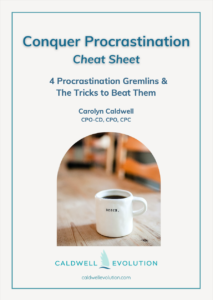How does one determine whether not doing something is delay and procrastination?
Procrastination is a one of the most common complaints and issues for all my clients whether they are seeking my support for decluttering, down sizing, business or life coaching. Curiously it all looks the same and the concerns are expressed the same way.
“Why do I keep procrastinating when I know I should be doing this (filling the blank with desired goal to accomplish)? Why can’t I just do it?”
Delay vs Procrastination: The Difference
Timothy Pychyl is one of my favourite resources on procrastination. His book Solving the Procrastination Puzzle has been a great resource and provided extremely helpful information.
Pychyl defines procrastination as “needless voluntary delay”. In other words an individual is choosing to delay action on an item, unnecessarily. He points out that other delay may be caused by factors outside of our control, resulting in a frustrating delay. For example we may need to wait for a supply back order to be available before starting on that fabulous DIY project. A delay may be caused by a shift in priorities. Instead of working on the project the weekend the supplies are available, you time is redirected to caring for a sick child. Balancing and juggling priorities is a day to day challenge for most people.
According to Pychyl all procrastination is delay but not all delay is procrastination. Some delay is waiting on another thing to be completed. Delay could activities out of our control.
Someday I Will Syndrome
Then there is the someday syndrome. Goals we have are unspecific. It is hard to accomplish something that is vague. When there isn’t an clear outcome, date and deliverable in place, often there is a lack of accomplishment that goes with the vagueness.
Solutions
Here are four key solutions that may helping with your delay and something thinking:
- Write it down. Whatever it is you want to accomplish, get it writing down to make it real and tangible.
- Break it down. Large vague project are really hard to move forward on. Make the project or item smaller and smaller into pieces and until you are guaranteed to e successful.
- Schedule the action or project. Most likely unless it is a very small project, you will be scheduling pieces of activity that lead to completion.

For more help with procrastination strategies, pick up a free copy of the Conquer Procrastination Cheat Sheet.










